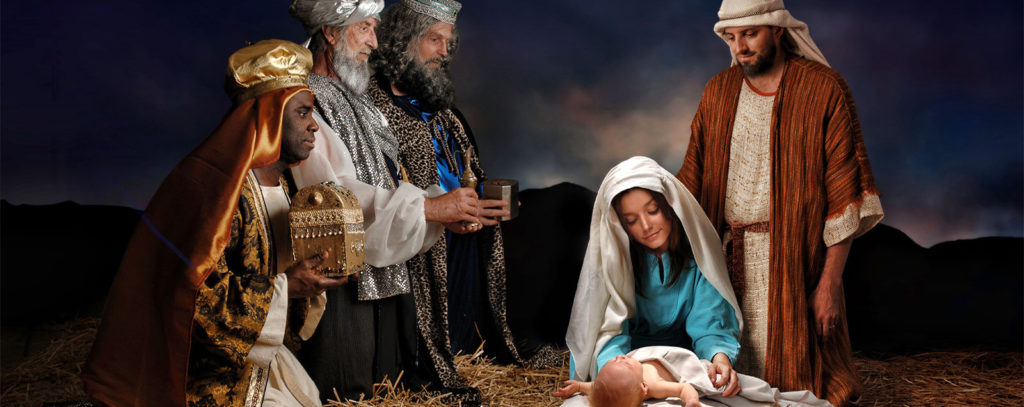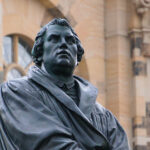
Most scholars believe the mention of three gifts has caused many people in church history to assume there were three wise men.
Christians around the world celebrate the birth of Jesus at Christmas, but how much do we really know about the biblical story? In Urban Legends of the New Testament: 40 Common Misconceptions, David Croteau explores and explains numerous misunderstandings of the Bible, including some from the Christmas narrative.
In this excerpt, Croteau discusses the hymn “We Three Kings of Orient Are.” He demonstrates how the actual biblical narrative may not line up with how we remember the story.
Related:
By David Croteau
We three kings of Orient are, bearing gifts we traverse afar.
Field and fountain, moor and mountain, following yonder star.
Probably written in 1857, but not appearing in print until 1863, this famous Christmas carol was written by John Henry Hopkins, who became a priest in the Episcopal Church. It was the featured song in a Christmas pageant he organized. Reverend Hopkins was able to write lyrics and a tune that has captured the text of Scripture so well. What a wonderful carol!
Unraveling the Legend
The opening line of this hymn brings to mind three questions.
1. “We three”—Were there three?
2. “kings”—Were they kings?
3. “from Orient are”—Were they from the Orient?
When I was in college, I was listening to J. Vernon McGee on the radio while driving to a friend’s house. While teaching on Matthew 2, he mentioned that there were not three wise men. My car swerved on the road as I exclaimed out loud: “Not three wise men?!” Every manger scene I had ever seen had three wise men. I wondered if he was denying the Bible. Then he read the verse, and I thought, Why did I think there were three wise men? I was simply stunned, shaken in my faith.
I want to investigate the opening line of this Christmas carol and compare it to what is stated in Scripture. Matthew 2:1 says, “After Jesus was born in Bethlehem of Judea in the days of King Herod, wise men from the east arrived unexpectedly in Jerusalem.” Verse 7 says, “Then Herod secretly summoned the wise men and asked them the exact time the star appeared.” Verse 16 mentions the wise men two more times, for a total of four times in this passage.
What can we glean about the “three kings from the Orient” in Matthew 2:1? The word translated “wise men” is plural, so there was more than one. But some translations have “magi,” the plural of “magus,” referring to priests in ancient Media and Persia. No translation used “king.” Also, the text says they came “from the east.” No translation says “Orient.” That’s what Scripture says.
Background Texts on the Wise Men
Most scholars believe the mention of three gifts has caused many people in church history to assume there were three wise men. In fact, the “three wise men” have been given names: Melchior (supposedly King of Arabia), Balthazar (supposedly King of Persia), and Caspar or Gaspar (supposedly King of India). Three ancient documents mention some details about these “three kings.”
The Armenian Infancy Gospel, which was written around AD 600, mentions the three names. The second document was a Greek text written in Alexandria, Egypt, around AD 500. The translation into Latin (titled Excerpta Latina Barbari) includes these names as well. Some people have proposed that these are legitimate texts on which to base this conclusion, but there is another document many people aren’t as familiar with: Revelation of the Magi.
This document was written in the eighth century in Syriac. It was kept in the Vatican library for many years and was recently translated into English. The translator believes the text goes back to a mid-second century document (I remain unconvinced). It was written as if the wise men themselves were writing it. While it is not a reliable source for interpreting Scripture, it has some interesting details regarding the wise men.
First, what characterizes the magi is that they pray in silence, which was abnormal during that time period. Second, there were twelve or more wise men, maybe even forty or fifty in the group. Third, they were from Shir, possibly a reference to China. Fourth, they were descendants of Seth, Adam and Eve’s third son. Being descendants of Seth, they had knowledge of an old prophecy passed down by word of mouth about a star that would appear proclaiming that God would come in human form. Those are some salient points from the Revelation of the Magi, an unreliable source for interpreting the New Testament text.
All the theories and traditions advocating there being three wise men are late and unreliable documents. An alternate tradition states there were at least twelve, but there wasn’t a uniform tradition throughout church history.
I believe it is unlikely that there were only three wise men. While I don’t have proof, I think there is some compelling evidence. There is no compelling reason to believe there were three wise men. On the one hand, if three men were traveling hundreds of miles with expensive gifts, it would seem to be unwise for them to go in a group of only three. On the other hand, they could have had an entourage go with them. While, theoretically, there could have been three, there could also have been thirty. We simply do not know the precise number.
Who Were They, and Where Were They From?
Were these men kings, magi, or wise men? They are known as kings because of the Christmas carol, but church father Tertullian (died AD 225) referred to them as kings as well. We don’t know for certain why he believed that. Regardless, in Daniel 2 the Greek word for magi is used to translate a Hebrew term that meant “astrologer.” (Daniel 2:2, 10)
Several hundred years before the New Testament, magi referred to astrologers, but words can change in meaning through time. By the time of the New Testament, magi were most likely non-Jewish, religious, and (possibly) priestly. They were skilled in several areas including astronomy, astrology, dream interpretation, fortune telling, and magic or divination. This is what characterized the magi.
The magi in Matthew 2 are likely not Jewish since they were ignorant of Old Testament Scriptures. They asked Herod to inform them about the birthplace of the Messiah. They appear to be religious scholars skilled in astronomy. They had some dreams while they were visiting Jesus, so they were apparently skilled in dream interpretation. They probably interpreted the stars to indicate that a great Jewish king was about to be born. New Testament scholar Craig Blomberg says, “They combined astronomical observation with astrological speculation.”
Were the wise men from the Orient? The answer could depend on what you mean by the word Orient. Years ago that word referred to any where east of the Mediterranean. Now it typically refers to East Asia, near China. If the latter definition is meant, then the answer is probably no. However, they were from an area east of Israel.
Given that astronomy was prevalent in Persia, and that it seems to have played a role in leading the wise men to Israel, perhaps a case can be made that wise men did come from Persia. However, the three gifts they brought (gold, frankincense, and myrrh) connect them to Arabia.
Since they appear to know something about Judaism, maybe there was a community of Jews in their homeland who supplied them with Old Testament passages (like Numbers 24:17) that led them to read the stars as pointing to the birth of a Jewish king. That would point to Babylon as their origin.
In the end we can’t be certain, but I think Babylon and Arabia are most likely. This journey would probably have taken several months from deciding they wanted to go, getting the supplies together, and making the long journey.

David Croteau
David is professor of New Testament and Greek in the Seminary and School of Ministry at Columbia International University.
Excerpted from Urban Legends of the New Testament. Used by permission of B&H Publishing.











